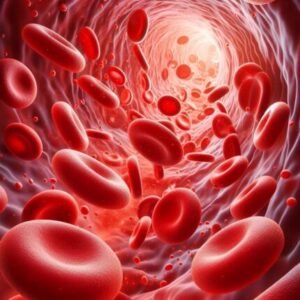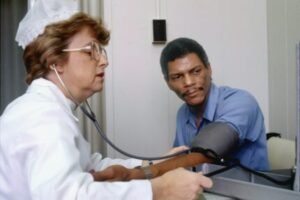Medically reviewed by Dr. Ramesh Gaddam, M.D. — Written by Sumalatha, D.N.H.E
4. Other Contributing Factors
Chronic Stress
Ongoing stress can negatively impact heart health by raising blood pressure and increasing the likelihood of unhealthy behaviors like smoking or overeating. Chronic stress can also lead to inflammation, which can damage arteries.
Poor Diet
A diet high in saturated fats, sugars, and processed foods can contribute to high cholesterol and obesity. These factors increase the risk of plaque buildup and heart disease, making a heart attack more likely.
Alcohol Abuse
Drinking too much alcohol can raise blood pressure and contribute to heart disease. It also adds extra calories, leading to weight gain, which further increases the risk of a heart attack.
Previous Heart Conditions
Having a history of heart disease or previous heart attacks raises the risk of having another one. Past heart issues can weaken the heart and make it more susceptible to future problems.
5. Acute Myocardial Infarction ECG
An ECG (electrocardiogram) is a key tool in diagnosing acute myocardial infarction (AMI).
During an AMI, the ECG may show specific patterns that indicate a heart attack, such as ST-segment elevation, T-wave changes, or Q waves.
These changes help doctors identify the affected area of the heart and assess the severity of the attack.
Early ECG testing is crucial for prompt treatment, as it helps guide decisions on interventions to restore blood flow to the heart.
6. Acute Myocardial Infarction Pathophysiology
Acute myocardial infarction occurs when blood flow to a part of the heart is suddenly blocked, usually by a blood clot forming over a ruptured plaque in a coronary artery.
This blockage deprives the heart muscle of oxygen, causing cell death and damage.
The extent of the heart damage depends on the location and duration of the blockage.
Inflammation, scar tissue formation, and changes in heart function often follow, leading to potential complications like heart failure or arrhythmias if not treated promptly
Conclusion
Understanding the causes and risk factors of acute myocardial infarction (AMI) is crucial for prevention and heart health.
Key causes include atherosclerosis, coronary artery spasms, and embolisms. Risk factors such as high blood pressure, high cholesterol, smoking, diabetes, obesity, and a family history of heart disease all contribute to the likelihood of a heart attack.
By addressing these factors through lifestyle changes and regular medical check-ups, individuals can significantly reduce their risk and maintain better heart health.
Frequently Asked Questions (FAQs)
What is the duration of acute MI?
The duration of an acute myocardial infarction (MI) can vary, but the intense phase typically lasts from 15 to 30 minutes. Without treatment, the heart muscle damage can continue for several hours. Prompt medical attention is essential to limit the extent of the heart damage.
What is the pain of acute MI?
The pain of an acute MI is often described as severe and persistent, typically felt as pressure, tightness, or squeezing in the chest.
The pain can radiate to the arms, neck, jaw, or back. It may be accompanied by shortness of breath, sweating, or nausea.
What is the difference between MI and acute MI?
“MI” refers to a myocardial infarction, commonly known as a heart attack, where part of the heart muscle is damaged due to a lack of blood flow.
“Acute MI” specifically refers to the initial, sudden phase of the heart attack when the blockage occurs, and immediate treatment is crucial to restore blood flow and minimize damage
What are four signs of myocardial infarction?
Four common signs of myocardial infarction (heart attack) include chest pain, shortness of breath, sweating, and nausea.
The pain often feels like pressure or squeezing in the chest and may spread to the arms, neck, or jaw.
What is the main cause of acute myocardial infarction?
The main cause of acute myocardial infarction is a blocked artery that stops blood from reaching the heart muscle.
This blockage is usually due to a buildup of plaque made from fat, cholesterol, and other substances.
How do you treat acute myocardial infarction?
Acute myocardial infarction is treated with medications, lifestyle changes, and sometimes procedures like angioplasty.
Quick medical help is vital to restore blood flow and reduce heart damage.
Is myocardial infarction curable?
Myocardial infarction itself is not curable, but it can be managed.
Treatment and lifestyle changes can help prevent further heart issues and improve quality of life.
Can you fully recover from myocardial infarction?
Many people recover from a myocardial infarction, but it often requires ongoing care, including medications, lifestyle changes, and regular check-ups to prevent future problems.
Can a person survive a myocardial infarction?
Yes, many people survive a myocardial infarction, especially if they receive prompt treatment.
Quick medical attention is crucial for increasing the chances of survival.
Can a myocardial infarction heal itself?
A myocardial infarction cannot heal itself. Medical treatment is necessary to restore blood flow and prevent further heart damage.
Can myocardial infarction cause death?
Yes, myocardial infarction can cause death if not treated quickly. Immediate medical attention is vital to reduce the risk of fatal outcomes.
Does myocardial infarction need surgery?
Not all myocardial infarctions require surgery. Some cases can be treated with medications or procedures like angioplasty.
However, severe cases may need surgery such as a bypass.
Can ECG detect heart blockage?
An ECG can detect signs of heart blockage, but it may not show all blockages. Further tests, like angiograms, might be needed for a clear diagnosis.
Is my heart OK if the ECG is normal?
A normal ECG is a good sign, but it doesn’t always rule out heart problems. If you have symptoms or risk factors, further tests might be necessary.
How painful is myocardial infarction?
Myocardial infarction can be very painful, often described as a heavy or crushing pain in the chest. The pain may also spread to other parts of the body, like the arms or jaw.
References
[1] https://www.ncbi.nlm.nih.gov/books/NBK459269/
[2] https://www.ncbi.nlm.nih.gov/books/NBK537076/
[3] https://www.msdmanuals.com/en-in/professional/cardiovascular-disorders/coronary-artery-disease/acute-myocardial-infarction-mi
[4] https://emedicine.medscape.com/article/1960472-overview
[5] https://en.wikipedia.org/wiki/Myocardial_infarction
[6] https://emedicine.medscape.com/article/155919-overview
[7] https://www.sciencedirect.com/topics/medicine-and-dentistry/acute-heart-infarction
[8] https://www.ahajournals.org/doi/10.1161/CIRCULATIONAHA.117.030798
Also Read:
Myocardial Infarction (Heart Attack): Causes, Risks, 9 Signs
Medically reviewed by Dr. Ramesh Gaddam, M.D.

General Physician, Diabetologist, and Critical Care Specialist.


